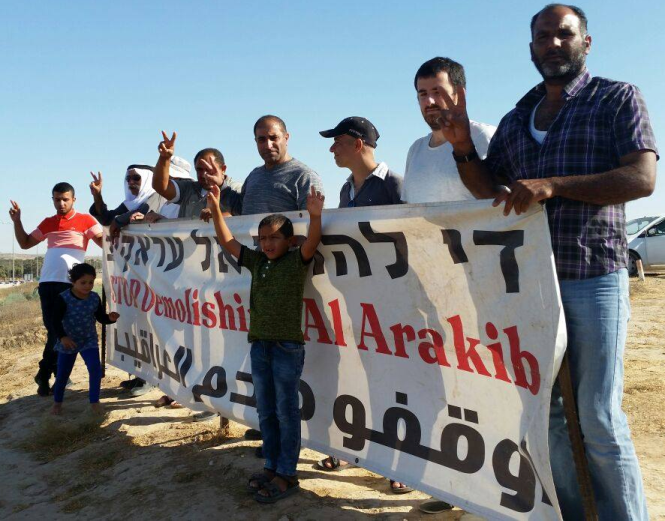Israeli authorities secured by a large contingent of police demolished the Arab-Bedouin village of al-Araqib in the Negev region of southern Israel for the 116th time since 2010 on Tuesday morning, August 1. This was the eighth such demolition of the unrecognized village this year. Officials from the Israel Land Authority (ILA), accompanied by police and bulldozers, raided the village and demolished all the corrugated metal homes in the area, which had been built by the village’s residents following the most recent demolition in early July.

Demonstrators protest the latest threatened demolition of Al-Araqib last Sunday, July 30, 2017, at Lehavim Junction in the Negev, two days before the operation razed the village for the 116th time. (Photo: Negev Coexistence Forum)
Al-Araqib is one of 35 Arab-Bedouin villages considered “unrecognized” by the State of Israel. According to the Association for Civil Rights in Israel (ACRI), more than half of the approximately 160,000 Arab Bedouin citizens of the state who reside in the Negev do so in unrecognized villages.
The Communist Party of Israel (CPI) released a statement condemning the continuing demolition of the unrecognized Arab-Bedouin villages and indicating that this destruction is spurred by the right-wing government’s policy of decreasing to a minimum the land settled by Arabs in the Negev, and transferring these populations to government-zoned townships to make room for the expansion of Jewish Israeli communities in their stead. The classification of the Arab-Bedouin villages as “unrecognized” prevents the residents from developing or expanding their communities. Furthermore the Israel authorities refuse to connect unrecognized Bedouin villages to the national water and electricity grids, and have excluded the communities from access to health and educational services.
Since 2010, al-Araqib residents have been ordered to pay more than two million shekels (approximately $541,000) for the cumulative cost of Israeli-enforced demolitions carried out against the village.
The unrecognized Bedouin villages were established in the Negev soon after the 1948 Arab-Israeli war during which the state of Israel was unilaterally declared by the Zionist Jewish community in Palestine. Many of the Bedouin were forcibly transferred to the current village sites during the 17-year period when Arab-Palestinians inside Israel were governed under Israeli military law, which officially ended in 1966, shortly before Israel conquered and occupied the Gaza Strip, the West Bank, Sinai and the Golan Heights, including East Jerusalem, in June 1967.
Now more than 60 years later, the villages have yet to be recognized by Israel and live under constant threats of demolition and forcible removal. Meanwhile, Israeli Jewish communities in the Negev continuously expand, with five new Jewish housing plans approved last year. According to an investigation conducted and published by the ACRI and Bimkom, two of the approved Jewish communities are located in areas where unrecognized Bedouin villages already exist.
Related: Posts on Al-Araqib


